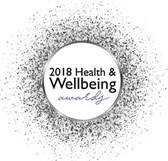|
One thing you discover as you age, is that things ache more. There are more sore bits, injuries take longer to heal and niggles can frustrate our efforts to be pain free.
The body simply isn't as resilient as it was, and we need to work harder to maintain stability and mobility. We are all aging, and we can't wait for a pain-free day to do something positive to turn the tide. It takes more effort to hold our ground than it ever has before and waiting will only set us back further. I had a recent minor skin surgery (thankfully nothing to worry about). It didn't stop me practicing. I had to modify my yoga postures and work around any forward bending so that the stitches could work their magic. My sprained ankle a couple of years back when I slipped into a hole in the park didn't derail my practice. My foot went black and blue and was swollen so cross legged was off the cards, but I simply had to avoid things that hurt, and ensure that I showed up to my practice with extra care and attention. A bit like if I have a sore in my mouth, I don't stop cleaning my teeth. I just brush them more carefully, respect the sore bits, but take care of the rest of my precious teeth and gums in the meantime. If your waiting for the day that nothing aches to get to your mat . . . The Pros - there are lots! Working with an injury can be brilliantly insightful. You'll discover an easily enhanced focus as the sheer risk of not paying attention is far greater. It is easy to view injuries as bad. Granted, no-one invites them, we all want to enjoy the freedom that good health affords. But discomfort is such an amazing opportunity for self-enquiry. Instead of fighting against, and getting frustrated by, your ailments and symptoms, treat the sensations of the cold / achey hip / swollen ankle etc., as the body giving you information about what it can and can't do today. Be curious about the patterns in the mind, the way judgement and negative bias creeps in, and the potential for your intentions to be derailed by over-thinking. All patterns worth getting to know. It is tempting to let movement and meditative practices drop off the priority list in the face of discomfort, congestion, fear etc. but it can be such an interesting and valuable time to practice. It affords new insights and rewards that are very different than if you were feeling fine. And the yoga still helps, even when it is more gentle than perhaps you would choose. You always feel better, more grounded, relaxed, energised, you'll recover sooner, and it can even adjust your relationship to the ailment to become more positive. I found Covid completely fascinating. I had new sensations in my body. My smell went completely. And mentally I knew I had 'it' - the dreaded thing that was sweeping across the world. It was in me, right now. If I allowed it, it could feel a bit scarey. But also there was a level of excitement. How interesting?! That thing that everyone is talking about, I get to experience it first hand, before anyone else I know. Was I going to be okay? Who knew. A completely new experience - how curious, a new adventure. I was lucky enough to have it while on holiday and at no point did I feel so ill that I contemplated hospital. There was even something of a relief at getting it. There was no need to avoid getting it any more, at least for a few weeks after I felt bullet proof. A layer of worry that I didn't even realise I had been carrying around had vanished. That was worth discovering - that I didn't even realise I was that worried. I had discovered a lot about what 'worry' in its more subtle guise looks and feels like. Worth knowing. And from there I just had to go with what unfolded next. My yoga practice was a revelation. My postures and breath felt different. Each practice held a sense of fascination at what it was actually like to be in a body with Covid. The physical sensations, plus the stuff in my mind. The temptation of dramatic narrative and fear of what might happen next, drawing me away from what was actually my direct experience of what was happening. The vividness of experiencing my new body, within the familiar ground of my daily practice, helped deepen my practice and level of attentiveness and meditation. All brilliant insights to carry forwards. Ultimately life is often out of our hands. We like to think we are in control, we often try to be which can take so much energy. Illness and injury are times when situations are taken out of your hands in a visceral way. And this has great value and benefit. This doesn't necessarily mean showing up to class with a streaming cold, but show up to something. Show up online and take it gently, take a short video, do your own personal practice. There is always something you can do, and it is always worth the effort. The old adage life is a journey, not a destination, applies at its best here. The journey is possibly the opposite of what you would have chosen, but there is plenty to enjoy anyway, it might just take a shift of mindset. Definitely something worth practicing.
0 Comments
It doesn't matter how much movement or breath or focus you are able to muster that day. Showing up, engaging in practice, connecting to your body, breath and more subtle aspects of yourself can be easily neglected, but remain instantly retrievable just by showing up next time.
Top tip: if you find you haven't got an hour or 15 minutes that week for practice, remove yourself from social media for a day and see how much time you actually have. What help can you need to support you in showing up? 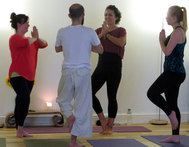 Yoga classes have begun to polarise. From the fast and sweaty vinyasa flow and Ashtanga yoga, to the restorative and Yin yoga classes that have emerged. They seem to be on two ends of a wide spectrum of modern postural yoga classes. People turn to yoga for a range of different reasons. Perhaps you've come to it to feel stronger or more flexible, or you enjoy the heat and sweat that it can build. Perhaps you enjoy the stillness and calm that it offers, or the good nights sleep it gains you. You may have an injury or pain that you are looking to sort out, or perhaps you just want that elusive feeling of wellbeing. They are all good reasons to practice yoga, and finding the right approach for your practice is more than just the immediate feeling it leaves you with. Your practice should leave you feeling better than when you started, and progressively better in the long term. You may be surprised that I even need to state this. But I regularly speak to practitioners and even yoga teachers who switch between two extreme styles of yoga practice in an effort to keep themselves balanced. Taking a strong vinyasa class supplemented with a Yin or restorative class seems a simple contradiction in approach. It's nice to change pace and explore from time-to-time. But to pursue the challenge and energy which then leaves you needing restoration to enable you to continue this cycle seems worth reflecting on. It is a cycle we often undertake in life which we then replicate on our yoga mats. Yoga practice is for the long term. It should support your primary aims as well as deepening your sense of internal balance with consistent practice. The balance of yoga doesn't begin on the mat, it beings before you get there, with your intention and choice of how to practice. Back to YogaSpace Homepage 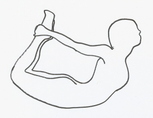 Yoga is great for improving our health and wellbeing. A well trained teacher will ensure that the class is safe and suitable for all participants. But yoga injuries do happen, and here are my top tips to ensure your yoga practice remains safe and enjoyable. 1) Listen to your body Yoga shouldn’t hurt. If it doesn't feel right, or your starting to feel strain in a vulnerable part of the body (e.g your knees, neck or lower back) then ease off and take a breather. Your body is yours so take care of it and work within safe limits, especially while you are getting started. 2) Start gently and build it up Don't go to your first class expecting to do everything. Whether you are seeking physical strength or improved breathing, connecting with yourself, focus, or relieving stress, there is no magic wand or quick fix to achieve these aims. Incremental changes will happen, and allowing yourself time to add challenges and layers of technique as you get used to the practices will bring the most benefit. Everyone has limitations, so be gentle with yourself and don’t be tempted to push it too soon. 3) Regular practice If you drop in to a class from time to time, your body will always be starting from the beginning and if there are any vulnerabilities, they are more likely to flare up. Regular practice will allow you to develop strength and stamina so that you can then further your practice. If issues or niggling pains do start to emerge, you'll have time to understand what triggers them and find ways around them. 4) Talk to your teacher Your teacher should be well-trained in a wide-range of injuries and ways to adapt the postures and techniques to suit you. Not all yoga teachers have this training (especially is they took their training over just a few weeks or months where they may only have covered postures, choreography and basic anatomy). Make sure your teacher understands any injuries or past vulnerabilities that you have so they can suggest alternatives or adaptations. You need to take some responsibility here and pro-actively talk to your teacher to ensure they can support you. 5) Yoga should never hurt Worth saying twice. Really. If it hurts, your body isn’t ready to go that deeply into it so ease off. Yoga classes aren’t (or shouldn’t be) competitive. Just because your neighbour on the mat next to you can do it, it doesn’t mean you should be able to. The class is there to benefit you, and every body in the class is different. So do things that will be helpful and have the wisdom and patience to know when to rest and wait for the next pose. Enjoy safe yoga practice and you will reap the rewards for years to come!  Affecting up to a third of breast cancer survivors, fatigue can't be underestimated for its impact on a sufferers daily life. Fatigue can be debilitating and is often not taken seriously enough. A study published recently has demonstrated the benefits of practicing yoga to help overcome persistent fatigue in breast cancer survivors. 12 weeks of yoga practice in a randomised, controlled study not only found significant reduction in fatigue, but also increased vigor. Details on the study can be found here (1). Also see the British Wheel of Yoga article here. This doesn't mean heading to your nearest group yoga class however. When suffering from fatigue it is important not to be exhausted by the yoga. A group yoga class would likely be too much to begin with. Short, gentle, regular yoga practices would be more beneficial, gradually progressing as improvements are felt. Personalised home yoga practice, or therapeutically applied yoga, is most effective when embarking on yoga for those suffering from fatigue. Get in touch for more info on getting started with your own home practice designed to meet your health and energy needs. (1) Bower, J. E., Garet, D., Sternlieb, B., Ganz, P. A., Irwin, M. R., Olmstead, R. and Greendale, G. (2012), Yoga for persistent fatigue in breast cancer survivors. Cancer, 118: 3766–3775. doi: 10.1002/cncr.26702 Return to YogaSpace homepage |
More blog articles >Categories
All
Archives
July 2024
|
|
Bristol YogaSpace Ltd
Princes Place, Bishopston Just off Gloucester Road Bristol BS7 8NP |
|

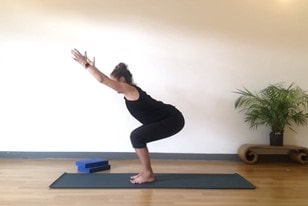
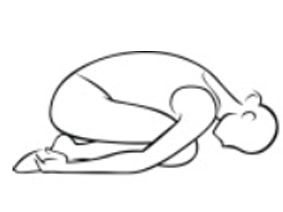

 RSS Feed
RSS Feed

